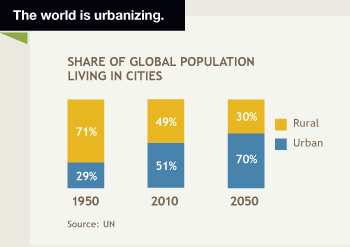LETTER TO SHAREHOLDERS (continued)
The Demands of a Growing World
Our efforts in 2010 built a solid platform for success in 2011 and beyond.
This year, we expect similar market conditions in Agribusiness, with strong demand and robust trade. High sugar prices and good demand for ethanol in Brazil, along with higher capacity utilization at our mills, should improve Sugar & Bioenergy results, relative to 2010. Food & Ingredients should perform well, and we expect notable improvement in Fertilizer.

Tight commodity supplies should keep prices higher than average, which will give farmers incentive to expand planted acreage and increase use of crop nutrients. Bigger crops this year and next would help moderate price inflation and benefit consumers.
However, there is much work to do to meet long-term, global demands. Most experts believe the global agribusiness and food markets will be tighter in the future than in the past. This is the result of a fundamental truth of our growing world: A global population reaching 9 billion by 2050 and generally enjoying higher living standards will generate unprecedented demand for food and agricultural products-1.5 billion metric tons of additional grains and oilseeds alone. Some estimate we will need to produce more food in the next 50 years than we have in the previous 10,000. Government policies promoting biofuels will add to total demand, which will need to be met in the face of supply constraints: limited arable land, competition for fresh water and restrictions on greenhouse gas emissions.
It is a daunting outlook that requires a broad approach-a "big tent" that accommodates a variety of viewpoints and encourages contributions from every part of society. We are confident that Bunge, as a global trade facilitator and an integrated producer of trusted, high-quality products, will be a valuable part of the solution.
Requirements for Tomorrow
Greater production is an obvious priority. We need more from farmers: small farmers like the one near our plant in India, who tripled his yield by using agricultural practices learned in an outreach program we support, and large farmers, like those in the U.S., who are growing a ton of corn on 37 percent less land and a ton of soy with 65 percent less energy than they were in the 1980s. We need more and better use of crop nutrients, greater innovations in seed technology and more people embracing these advances around the world.
But production alone is not enough. With 70 percent of the world residing in cities by 2050 and billions living in water-constrained areas, more people will rely on commercial food production for their daily needs. At the same time, competition for land and necessary environmental conservation will constrain agricultural expansion. We will need to ensure that the most agriculturally productive areas-places like South America, which has over 10 times the per capita water resources of Asia-can supply other regions efficiently. Trade will have to increase. Society and the environment demand it.
These shifts will require contributions from the public sector in the form of better infrastructure and more efficient trade policies. Spending on infrastructure as a percentage of GDP in the U.S. and Brazil-two of the world's principal breadbaskets-is less than it was in the 1960s and 1970s, respectively, and the trade-weighted average global tariff for agricultural products is 25 percent versus only 8 percent for industrial goods.
Private enterprise has important responsibilities to fulfill as well: to create efficient linkages from farm to market and among regions, to develop reliable production chains that deliver trusted, high-quality products at lower costs, and to innovate. Bunge is particularly well-positioned to provide these services and capture opportunities inherent to them.
